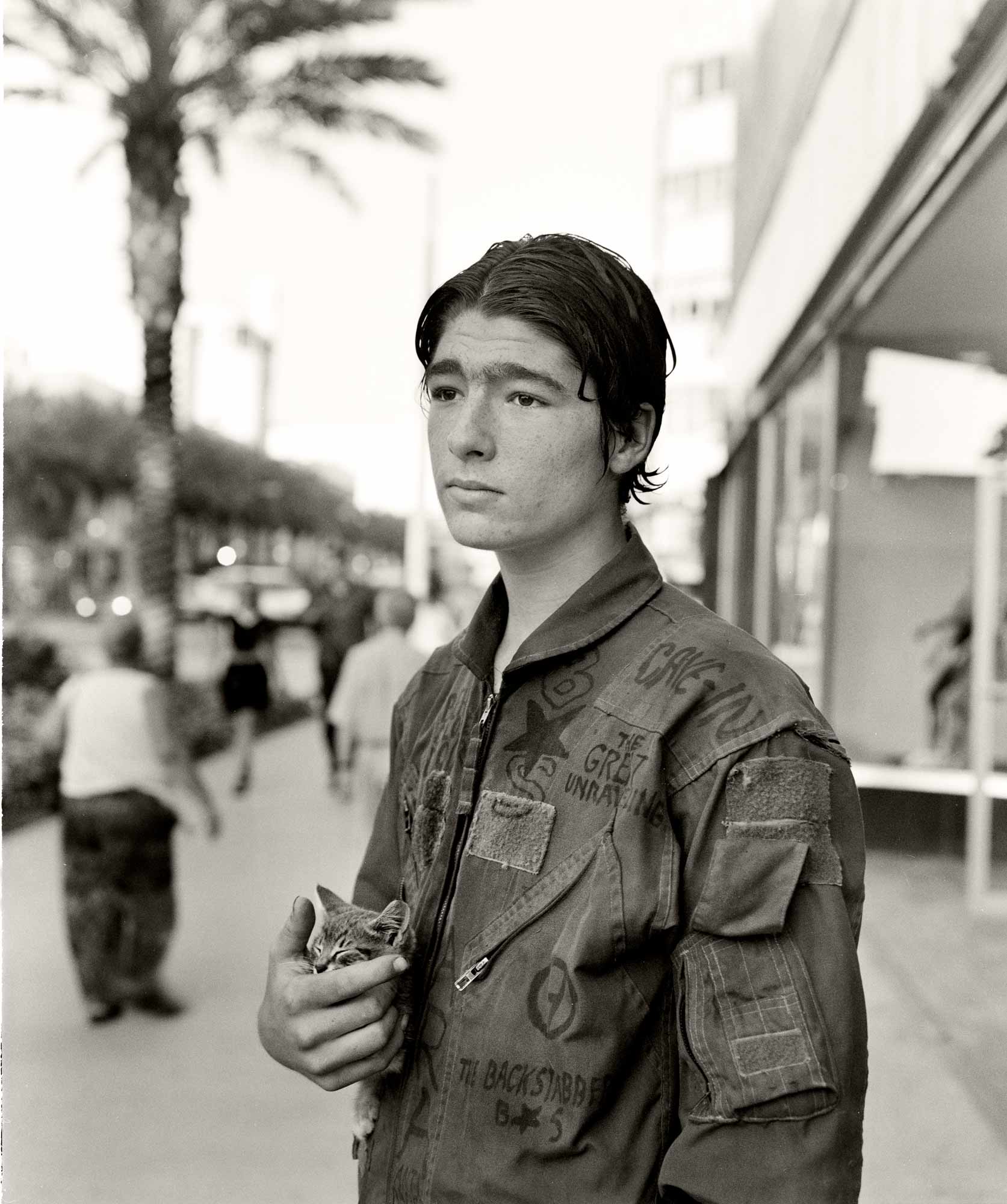Miami Beach, captured in its hedonistic heyday
- Text by Niall Flynn
- Photography by Barry Lewis

Between 1988 and 1995, British photographer Barry Lewis was a regular fixture at Miami Beach, documenting the coastal strip as it bounced back to life following a lengthy hangover.
The two decades prior had seen it beset with violence, as drug cartels clashed with US authorities (and each other) in a series of armed conflicts. On top of that, racial tensions were simmering in the city, while an increasingly ageing population also played a role in Miami’s transition from post-war party town to a place that was generally considered unattractive.
But towards the end of the ’80s, the narrative began to change. Miami had been home to a gay nightlife scene from as the early as the 1930s, but a fresh influx of arrivals from the LGBT community helped halt an elongated period of social and economic decline. As its cultural scene became exciting once more, others followed, resulting in fresh development in the city.
 “It was cheap to live there, always warm, the beaches were safe, drugs were plentiful, and there were cheap flights from the Caribbean and New York down to Miami,” Lewis remembers. “It became the party town of America – again!”
“It was cheap to live there, always warm, the beaches were safe, drugs were plentiful, and there were cheap flights from the Caribbean and New York down to Miami,” Lewis remembers. “It became the party town of America – again!”
The beach, with its eclectic cast of animated characters, became emblematic of its resurgence. For Lewin – who first arrived in the city in 1987, immediately struck by its ragged charm – it was the perfect place to be, and the perfect time to be there.
 “It was a more relaxed style of picture-taking than my usual rapid framing approach – here I could take my time and engage with people,” he says, recalling the time he spent capturing body builders, drag queens, surfers and club kids as they went about their business in the sun.
“It was a more relaxed style of picture-taking than my usual rapid framing approach – here I could take my time and engage with people,” he says, recalling the time he spent capturing body builders, drag queens, surfers and club kids as they went about their business in the sun.
“And the photography became so much more than the pictures. It became about meeting an extraordinary range of people who all talked about their lives with as much colour as the buildings around them.”
 Today, those images come together to form Miami Beach 1988 – 1995, a book published by Hoxton Mini Press. Shot in black and white – a striking contrast to the colourful environment – Lewis’ photographs capture a place in its hedonistic heyday.
Today, those images come together to form Miami Beach 1988 – 1995, a book published by Hoxton Mini Press. Shot in black and white – a striking contrast to the colourful environment – Lewis’ photographs capture a place in its hedonistic heyday.
“Maybe it was the heat, maybe it was the atmosphere of people relaxing together, but everyone was willing to be photographed. Everyone had their story. There was an acceptance and openness to strangers. We were, perhaps, all strangers there.”





 Miami Beach 1988-1995 is available now from Hoxton Mini Press.
Miami Beach 1988-1995 is available now from Hoxton Mini Press.
Enjoyed this article? Like Huck on Facebook or follow us on Twitter.
You might like

Jake Hanrahan: “Boys can cry, but we don’t all fucking want to”
Hard Feelings — In the latest edition of our column on masculinity and fatherhood, Rob Kazandjian speaks to the conflict filmmaker-journalist and Popular Front founder about his childhood, the found family and community at his Muay Thai gym, and the “complete counterculture” of ‘no rules’ fighting.
Written by: Robert Kazandjian

Euphoric portraits of queer joy and resistance at Trans Pride Brighton
Let us piss — Now over a decade old, the event grew to become Europe’s largest trans pride march. In a year when trans rights have come under the microscope more than ever, we went to this year’s edition, finding grassroots unity and collective rage.
Written by: Ella Glossop

Remembering the radical anti-nuclear Greenham Women’s Peace Camp
Life at the Fence — In the early ’80s, a women’s only camp at an RAF site in Berkshire was formed to protest the threat of nuclear arms. Janine Wiedel’s new photobook revisits its anti-establishment setup and people.
Written by: Miss Rosen

A new documentary traces the rise, fall and cratering of VICE
VICE is broke — Streaming on MUBI, it’s presented by chef and filmmaker Eddie Huang, who previously hosted travel and food show Huang’s World for the millennial media giant.
Written by: Ella Glossop

Warm, tender photos of London’s amateur boxing scene
Where The Fire Went — Sana Badri’s new photobook captures the wider support networks and community spirit around the grassroots sport, as well as the significance of its competitions to the athletes who take part.
Written by: Isaac Muk

We are all Mia Khalifa
How humour, therapy and community help Huck's latest cover star control her narrative.
Written by: Alya Mooro

